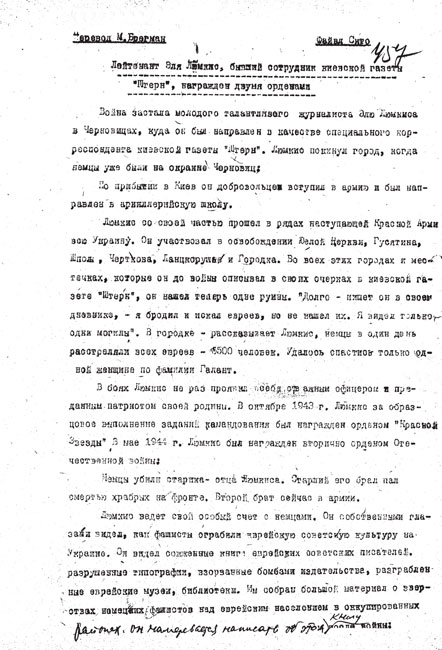Elia (Ilia) Liumkis was born in 1908 in Kiev Province, Ukraine.
While working at a factory, he published articles in several Yiddish newspapers about the life of Jewish workers. Later he worked as a professional journalist, including for the main Yiddish newspaper in Ukraine, Der Shtern, that transferred its activity from Kharkov to Kiev in 1937. In 1939 Liumkis' Yiddish book about Jewish musicians, Pianists, was published in Kiev. On the eve of the war Liumkis was a correspondent for a newspaper in the city of Chernovtsy (Cernăuți), in an area that had been annexed by the USSR in the summer of 1940.
At the beginning of the Soviet-German war, in July 1941 Elia Liumkis went to the conscription center in Kiev and volunteered to serve in the Red Army. He was apparently sent to a military training school and, in August 1942, with the rank of lieutenant, to the North Caucasus Front. Later he fought on the 1st Ukrainian Front. He served as the commander of a mortar platoon and ended the war as assistant to the head of operations of the headquarters of a Soviet infantry division in Prague. He was awarded with Orders of the Red Star and Orders of Patriotic War, both 1st and 2nd class.
Liumkis was particularly shocked when he compared the prewar Jewish life that he had described for Yiddish newspapers with the destruction of Jewish life under German rule. He collected materials on the anti-Jewish atrocities in the Nazi-occupied territories. During the war Liumkis learned that his father had been killed by the Germans.
Immediately after the war Liumkis became head of the culture department of the Eynikayt newspaper published by the Jewish Anti-Fascist Committee. One of his main topics at that time was the new, post-war wave of Jewish resettlement in the Birobidzhan Jewish Autonomous Region (JAR). He even accompanied groups of Jewish settlers moving to the JAR in 1947. Later this became the topic of his second Yiddish book The Trains are Headed for Birobidzhan, published in Moscow in 1948.
In 1948 Elia Liumkis was living in Riga when he was arrested by the MGB (the initials of the Soviet secret police agency of that time). He was released in 1956 after death of Stalin, during Khrushchev's policy of "rehabilitation."
Fayvl Sito about Elia Liumkis
The Yiddish writer Fayvl Sito wrote the following in his article "Lieutenant Elia Liumkis, a former correspondent of the Kiev newspaper Shtern, was awarded two orders [military honors]":
"With his unit Liumkis traversed the whole Ukraine in the ranks of the advancing Red Army. He took part in the liberation of Belaia Tserkov, Husiatyn, Shpola, Czortków, Liantskorun [now Zarechanka], and Gorodok [Gródek]. In all those towns and villages, which before the war he had described in his sketches in the Kiev newspaper Shtern he now found only ruins.
He wrote in his diary: 'For a long time I wandered around looking for Jews, but I didn't find any. I saw only graves.' Liumkis noted 'In Gorodok in one day the Germans shot all of the Jews – 5,500 people. Only one Jewish woman named Galant survived….'
Liumis had his own personal account to settle with the Germans. With his own eyes he saw how the fascists had despoiled Jewish culture in Ukraine. He saw burned books of Jewish writers, ruined printing houses, publishing establishment destroyed by bombs, looted Jewish museums and libraries…."
From: GARF 8114-1-167, copy YVA JM/26145.







